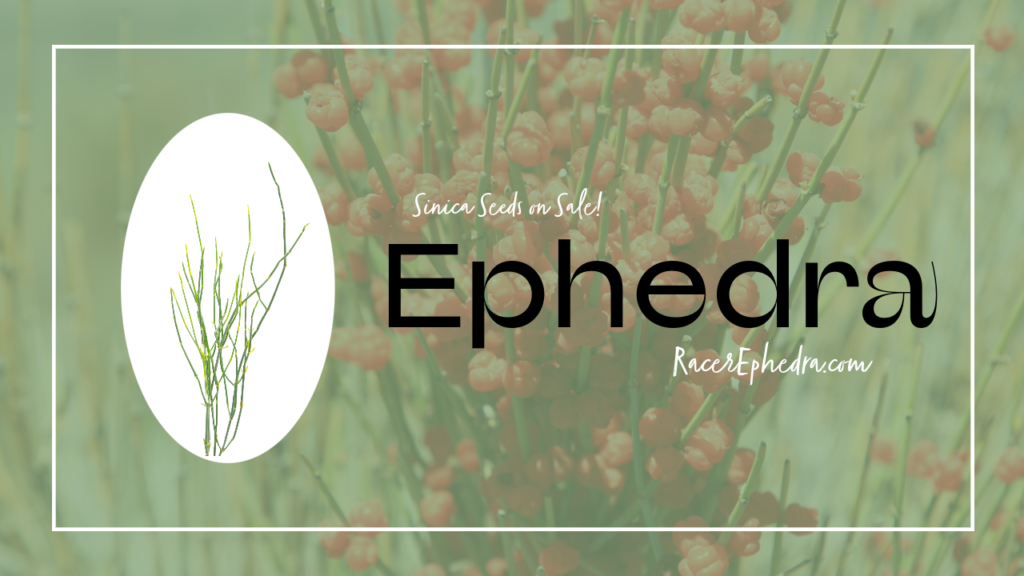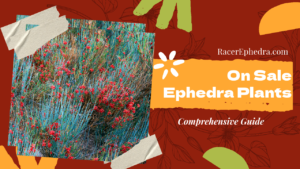Are you searching for a reliable source to buy legal Ephedra Sinica seeds? Look no further! In this comprehensive guide, we will delve into the world of Ephedra Sinica, its uses, benefits, and where to find legal seeds for sale. Whether you are a gardening enthusiast or interested in exploring the medicinal properties of this ancient plant, this article will provide you with all the information you need.

Understanding Ephedra Sinica
Ephedra Sinica, also known as Ma Huang, is a shrub that has been used for thousands of years in traditional medicine. It has a long history of use in treating various respiratory conditions such as asthma and sinusitis. Traditionally, the aerial parts of the plant are dried and brewed into a tea. Today, it is also available in various prepared dosage forms such as tablets, capsules, extracts, and tinctures.
The active phytochemicals in Ephedra Sinica responsible for its therapeutic effects are ephedrine and pseudoephedrine. These compounds act as alpha and beta adrenergic receptor agonists, stimulating the central nervous system and enhancing norepinephrine release from sympathetic neurons. Ephedra Sinica has been found to potentiate the effects of methyl xanthine drugs, commonly used in the treatment of asthma.
Ephedra Sinica is a fascinating plant with a rich history of medicinal use in both China and India. This low evergreen shrub is known for its small scaly leaves and has been used for centuries to treat a variety of conditions such as colds, fever, headaches, coughing, wheezing, and more.
FDA and Ephedrine Alkaloids
However, it’s important to note that the U.S. Food and Drug Administration (FDA) banned the sale of dietary supplements containing ephedrine alkaloids in 2004. These alkaloids are stimulant compounds found in Ephedra Sinica and some other plants. Prior to the ban, ephedra was commonly used as an ingredient in dietary supplements that were promoted for weight loss, increased energy, and enhanced athletic performance.
The FDA’s decision to ban ephedrine alkaloids was based on various factors. One of the main concerns was the potential health risks associated with these compounds. Research showed that dietary supplements containing ephedrine alkaloids could lead to serious side effects, including heart attacks, strokes, and even death.
Studies also revealed that ephedrine alkaloids had limited effectiveness when it came to weight loss and performance enhancement. It is worth noting that the ban does not extend to traditional herbal preparations of Ephedra Sinica, which are still used in traditional Chinese medicine under the supervision of trained practitioners.
Since the ban, there have been stricter regulations and more scrutiny surrounding the use of Ephedra Sinica and its derivatives in dietary supplements. It’s important for consumers to be aware of these regulations and to exercise caution when considering any products claiming to contain ephedrine alkaloids.
Similarly, Ephedra Sinica is a plant with a long history of medicinal use. While it has been used for various purposes, including weight loss and performance enhancement, the sale of dietary supplements containing ephedrine alkaloids has been banned in the United States due to safety concerns. It’s always advisable to consult with a healthcare professional before using any herbal supplements or alternative medicines.
The Benefits of Ephedra Sinica
Ephedra Sinica offers a range of potential benefits for those seeking natural remedies for respiratory conditions and other ailments. Some studies suggest that ephedrine alkaloids, found in Ephedra Sinica, may be effective in the management of asthma and chronic obstructive pulmonary disease (COPD). These compounds have been shown to prevent endoplasmic reticulum stress, mast cell degranulation, and macrophage chemotactic migration, which are all involved in respiratory disorders.
Additionally, recent research has explored the potential of Ephedra Sinica in the management of rheumatoid arthritis and myasthenia gravis. Although further studies are needed to confirm these findings, there is promising evidence that Ephedra Sinica may have anti-inflammatory properties and could be a potential candidate for the treatment of these conditions.
Ephedra (Ma-Huang)
Ephedra, also known as Ma-Huang, is a plant that contains various ephedrine alkaloids, including ephedrine and pseudoephedrine. It has been used for a variety of purposes, but its most well-known uses are in weight reduction and energy enhancement.
In the United States, dietary supplements containing ephedra were marketed as products that could potentially aid in weight loss and boost energy levels. However, it is important to note that ephedra can also be used in the manufacture of methamphetamine, which is why several governmental agencies have inquired into its safety.
Ephedra Containing Products
Due to reported adverse reactions from ephedra-containing products, the use of dietary supplements containing ephedra has been regulated by these agencies. In fact, there has been a ban on the sale of ephedra-containing supplements in the United States since 2004, and this ban remains in effect today.
It is crucial to understand that ephedra-containing substances are not only used in dietary supplements but also have other applications. As mentioned earlier, ephedra can be utilized in the production of methamphetamine. This is why there has been such scrutiny and regulation surrounding the use of ephedra.
Regardless, while ephedra has been touted for its potential benefits in weight reduction and energy enhancement, it is important to recognize the potential risks associated with its use. The ban on ephedra-containing supplements in the United States reflects concerns regarding the safety of these products. If you are considering using any dietary supplement, it is always advisable to consult with a healthcare professional to ensure your safety and well-being.
Ergogenic Aids
Ergogenic aids are substances or techniques that are believed to enhance athletic performance. One such aid that has gained a lot of attention is Ephedra and its associated compounds. However, it is important to note that Ephedra has been banned by the majority of amateur and professional sporting leagues.
In fact, as of April 2004, it has been illegal to manufacture or sell ephedra and its derivatives over the counter in the United States. This ban was put in place due to safety concerns surrounding the use of ephedra. While these substances are still widely available via the internet, it is important to understand the risks and potential consequences of using them.
The ban on ephedra was not only implemented by sporting leagues but also by the NCAA during the mid-1990s. However, it was only a few years ago that testing in collegiate athletes began after a 2001 NCAA study revealed that 3.9% of their athletes reported the use of ephedra over the previous 12 months.
The use of ephedra and its associated compounds as an ergogenic aid is not without risks. Ephedra is known to have stimulant effects and can increase heart rate and blood pressure. It has also been associated with adverse cardiovascular events, including heart attacks and strokes.
Additionally, ephedra can have negative effects on the central nervous system, leading to anxiety, insomnia, and even psychosis in some cases. It can also cause gastrointestinal disturbances, such as nausea and vomiting.
It is important to note that while ephedra may have some short-term performance-enhancing effects, these come at a significant cost to one’s health. The risks associated with using ephedra far outweigh any potential benefits.
Improving Athletic Performance
As an athlete or someone interested in improving athletic performance, it is crucial to focus on safer and more sustainable methods. This includes proper nutrition, hydration, adequate rest, and training techniques tailored to your specific goals.
There are also legal and safe alternatives available on the market today that can help enhance performance without risking your health. It is always recommended to consult with a healthcare professional or a certified sports nutritionist before considering any ergogenic aids.
Notwithstanding, while Ephedra and its associated compounds were once popular ergogenic aids, they have been banned by most sporting leagues due to safety concerns. The risks associated with using these substances far outweigh any potential performance-enhancing benefits. It is important to prioritize your health and explore safer alternatives for improving athletic performance.
Ma Huang Bioactivity
Ma Huang, also known as Ephedra sinica, is an evergreen shrub that is native to central Asia. It has gained attention due to its bioactivity, specifically its primary active constituent called ephedrine. Ephedrine has been extensively studied both on its own and in combination with caffeine.
One of the main properties of ephedrine is its thermogenic effect. This means that it has the ability to increase the body’s metabolic rate, leading to an increase in calorie burning and potentially weight loss. The thermogenic properties of ephedrine are mainly attributed to its action as a sympathicomimetic compound.
Studies have suggested that the combination of ephedrine and caffeine can be particularly effective in reducing weight. This combination has been found to further enhance the thermogenic effect and increase fat oxidation. It is believed that caffeine acts synergistically with ephedrine, boosting its effectiveness in promoting weight loss.
Meta-analyses of the effects of Ephedra and ephedrine have shown that a modest short-term weight loss can be achieved. However, it is important to note that safety concerns have been raised regarding the use of ephedrine and products containing ephedra.
FDA and Regulatory Actions
Due to these safety concerns, EU authorities and the FDA have taken regulatory actions to restrict or ban the use of ephedrine and ephedra-containing products. These actions were taken in response to reports of adverse effects, including cardiovascular events and even fatalities associated with the use of these substances.
It is crucial to prioritize safety when considering the use of any supplement or product containing ephedrine or ephedra. It is advisable to consult with a healthcare professional before starting any weight loss regimen or using such products.
Moreover, Ma Huang or Ephedra sinica contains ephedrine, which has been studied for its bioactivity and potential weight loss effects. The combination of ephedrine and caffeine has shown promise in promoting weight loss, but safety concerns have led to regulatory actions restricting their use. Consultation with a healthcare professional is recommended before using any products containing ephedrine or ephedra.
Legal Considerations
It is important to note that the sale of dietary supplements containing ephedrine alkaloids, including Ephedra Sinica, has been banned by the U.S. Food and Drug Administration (FDA) due to safety concerns. The use of ephedrine alkaloids has been associated with adverse cardiovascular outcomes, such as heart attack and stroke. Therefore, it is imperative to ensure that any Ephedra Sinica seeds you purchase are legal and comply with regulations in your country.
Amphetamines
Amphetamines have a long and interesting history in the field of medicine. Derived from the plant Ephedra sinica, amphetamine derivatives have been utilized for their medicinal properties for thousands of years. However, it wasn’t until the late 19th century that modern pharmaceutical processes allowed for the synthesis of amphetamine.
The first synthesis of amphetamine took place in 1887, opening up a whole new realm of possibilities in the medical world. This breakthrough paved the way for the creation of other amphetamine derivatives such as methamphetamine and 3,4-methylenedioxymethamphetamine (MDMA), commonly known as ecstasy.
During World War II, methamphetamine gained widespread use among the German military as a stimulant to combat fatigue. Its ability to enhance alertness and focus made it a valuable tool for soldiers on the battlefield. However, it was during this time that the negative effects and potential for abuse of methamphetamine became apparent.
Methamphetamine Abuse
Fast forward to the present day, and we see that methamphetamine abuse has become a significant social issue, particularly in the American Midwest. The rise of “crystal meth” addiction has had devastating consequences for individuals, families, and communities alike.
On the other hand, MDMA, also known as ecstasy, emerged as a recreational drug in the early 20th century. Initially used in psychotherapy due to its ability to induce feelings of empathy and emotional openness, MDMA gained popularity within the party and rave scene. However, it is important to note that MDMA is classified as a Schedule I substance in many countries due to its potential for abuse and adverse health effects.
Markedly, amphetamines have a complex history that spans millennia. From their origins in ancient medicinal practices to their synthesis in modern pharmaceutical labs, these substances have had both positive and negative impacts on society. While amphetamines can be beneficial when used under medical supervision, their potential for abuse and addiction should not be overlooked. It is crucial for individuals to approach these substances with caution and seek professional help if they find themselves struggling with addiction.
Finding Legal Ephedra Sinica Seeds for Sale
When looking to buy legal Ephedra Sinica seeds, it is crucial to find a reputable source that adheres to the necessary regulations. Here are some tips to help you find reliable suppliers:
- Research Online: Conduct a thorough online search to find reputable suppliers of Ephedra Sinica seeds. Look for well-established companies with positive customer reviews and a track record of providing high-quality products.
- Check Legal Requirements: Ensure that the supplier complies with all legal requirements and regulations regarding the sale of Ephedra Sinica seeds in your country. This will help you avoid any legal issues and ensure that you are purchasing from a trustworthy source.
- Seek Recommendations: Reach out to gardening communities, herbalists, or health professionals who may have experience with Ephedra Sinica seeds. They can provide valuable insights and recommend reliable suppliers.
- Verify Seed Quality: Before making a purchase, inquire about the quality of the seeds. Reputable suppliers will be transparent about the source of their seeds and may provide information about their cultivation practices.
- Customer Support: Choose a supplier that offers excellent customer support. This will ensure that any queries or concerns you may have about the seeds or their cultivation will be promptly addressed.
Cultivating Ephedra Sinica from Seeds
Once you have obtained legal Ephedra Sinica seeds, you can start cultivating this fascinating plant in your own garden. Here are some essential tips for successful cultivation:
- Soil and Light Requirements: Ephedra Sinica thrives in well-drained, sandy soil with full sun exposure. Ensure that the soil is slightly alkaline and has good drainage to prevent waterlogging.
- Germination Process: Start by scarifying the seeds, which involves gently scratching the outer seed coat to enhance germination. Soak the scarified seeds in warm water for 24 hours before planting.
- Planting: Plant the seeds in pots or directly in the garden bed. Place the seeds about an inch deep in the soil and cover them lightly. Water the soil evenly to keep it moist but not saturated.
- Temperature and Watering: Ephedra Sinica prefers warm temperatures between 60-80°F (15-27°C). Water the plants regularly, especially during dry periods, but avoid overwatering as it can lead to root rot.
- Growth and Maintenance: Ephedra Sinica is a low-maintenance plant and requires minimal pruning. However, it is essential to monitor for pests and diseases and take appropriate measures if necessary.
Harvesting and Utilizing Ephedra Sinica
Ephedra Sinica can be harvested once the plants have matured, usually after two to three years. The aerial parts of the plant, including the stems and leaves, can be dried and used to make herbal preparations such as teas, tinctures, or extracts. It is important to follow proper guidelines and dosage recommendations when using Ephedra Sinica for medicinal purposes.
Safety Precautions and Potential Side Effects
While Ephedra Sinica has been used in traditional medicine for centuries, it is essential to exercise caution and be aware of potential side effects. The use of ephedrine alkaloids, especially in high doses or for an extended period, can lead to adverse effects such as nervousness, anxiety, palpitations, tachycardia, gastrointestinal upset, nausea, diarrhea, headache, and dizziness.
It is crucial to consult with a healthcare professional before using Ephedra Sinica or any herbal supplements, especially if you have pre-existing medical conditions or are taking other medications. They can provide guidance on proper usage, potential interactions, and help ensure your safety.
Conclusion
Ephedra Sinica is a remarkable plant with a rich history and potential therapeutic benefits. While the sale of ephedrine alkaloids has been banned, legal Ephedra Sinica seeds can still be found from reputable suppliers. By following the guidelines provided in this guide, you can embark on a rewarding journey of cultivating and utilizing this ancient medicinal plant. Remember to prioritize safety, consult with professionals, and enjoy the process of exploring the wonders of Ephedra Sinica in a responsible and legal manner.
Disclaimer: The information provided in this article is for informational purposes only and does not constitute medical advice. Always consult with a healthcare professional before using any herbal supplements or starting a new treatment regimen.
References
National Center for Complementary and Integrative Health Ephedra Health Info https://www.nccih.nih.gov/health/ephedra
Vishal S. Vaidya, Harihara M. Mehendale, in Encyclopedia of Toxicology (Second Edition), 2005 https://www.sciencedirect.com/topics/medicine-and-dentistry/ephedra
Drugs for Neuropsychiatric Disorders Kane O. Pryor, Kingsley P. Storer, in Pharmacology and Physiology for Anesthesia (Second Edition), 2019



